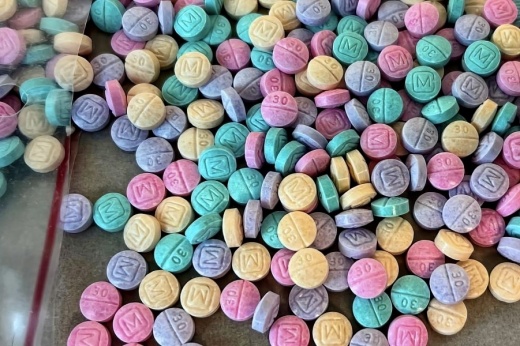Houston High Intensity Drug Trafficking Areas hosted a press conference Oct. 13 to promote the film and share how fentanyl is impacting the region.
HHIDTA Director Mike McDaniel said the federally funded program exists to support local, state and federal agencies working together to dismantle major drug trafficking organizations.
“We have learned through many of our partners here today that, unfortunately, we can't arrest our way out of it,” he said.
Current situation
Wendell Campbell, drug intelligence officer with HHIDTA, said fentanyl is the No. 1 drug threat facing the region.
“We are in a situation where we have individuals shipping a product to our country—a toxic substance that we refer to as illicitly manufactured fentanyl—and [it] is coming in our country at such a rate that it is now the leading cause of death from 18-year-olds to 45-year-olds,” Campbell said.

As fentanyl prices have dropped, these pills have become more prevalent. Harris County data shows fentanyl overdose deaths have outpaced cocaine, methamphetamine and heroin overdose deaths since 2021.
Harris County fentanyl overdose deaths increased from 104 in 2019 to nearly 574 in 2022, according to the Harris County Institute for Forensic Science. Campbell said overdose deaths are often underreported.
“Fentanyl has changed everything,” he said. “It's changed families; it's changed communities; it's changed school districts. And that imprint from fentanyl can't be removed.”
Montgomery County Sheriff Rand Henderson said the agency had “barely heard of” fentanyl and had not seen any fentanyl overdoses as recently as 2017. As of 2023, he said his team sees fentanyl overdoses every day.
“No one is immune from addiction just because of how well they prospered in their job or how secure their home life is. There are a lot of factors that lead to that,” Henderson said.
By the numbers
According to data from the Centers for Disease Control and Prevention:
- Fentanyl is the leading cause of death for people ages 18-45 in the U.S.
- One American overdoses every five minutes. This amounted to 109,000 deaths in 2022.
- A lethal dose of fentanyl is about 2 milligrams. For context, the average sugar packet contains 4,000 milligrams.
Several Texas laws passed this year to prevent fentanyl overdose deaths—particularly in public schools. Cleveland ISD in the northeast Houston region had 15 drug overdoses among high school students in the first nine weeks of the 2023-24 school year, said Joy Alonzo, Texas A&M University Health Opioid Task Force co-chair.
This task force is helping school districts across the state comply with Senate Bill 629, which requires all public middle and high school campuses to be equipped with the opioid antagonist naloxone, Alonzo said. Individuals can request naloxone at www.morenarcanplease.com.
House Bill 3908 was also signed into law this year, which requires evidence-based fentanyl abuse prevention and drug poisoning awareness education in public schools.
One more thing
“Fentanyl Unlimited” will open Oct. 20 at 14 theaters across the country, including at Xscape Theatre, 16051 Old Conroe Road, Conroe. The film is initially slated to run for one week.
“This movie has been criticized for being too graphic,” Minn said. “What has more impact—if I told you what happened or if I showed you what happened?”






